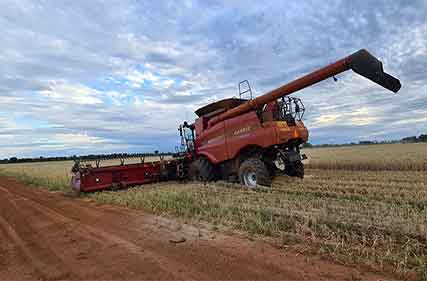 Always keep bystanders at least two-and-a-half times the length of the recovery straps, cables, or chains away from – and to the side – of the recovery. Never stand next to it[/caption]
Always keep bystanders at least two-and-a-half times the length of the recovery straps, cables, or chains away from – and to the side – of the recovery. Never stand next to it[/caption]
The state’s peak farming body is warning people about the dangers of bogged machinery, with three fatalities so far this year.
High input prices and a wet season has made this season’s crop one of the most expensive ever, and with flooding likely to reduce the amount that can be harvested, the risk of getting heavy machinery stuck in a paddock is high.
NSW Farmers Grains Committee chair Justin Everitt said there had been three fatalities involving the recovery of bogged vehicles or machinery, but the number of injuries and near misses were unknown as they were often not reported.
“We know people will feel under the pump to try and recoup some of the costs of sowing this crop, and that can lead to working in conditions where you’re likely to get stuck,” Mr Everitt said.
“This just adds to the pressure, and I know from experience it can be frustrating, but it’s really very important to be extra careful, because we’ve seen the disastrous consequences that can result from recovery gone wrong.
“Farms are an essential workplace but also a potentially dangerous one, so we all need to take care and work safely, because nothing can replace a life.”
According to SafeWork NSW, a 33-year-old farmer sustained fatal head injuries during the extraction of a bogged bulldozer at his neighbour’s farm in June. The man had been assisting his neighbour with the extraction when one of the two D-shackles connecting the recovery strap failed and was propelled through the glass door of the bulldozer.
Charles Laverty from the NSW Farmers Farm Safety Advisory Program said it was important to always take a minute or two to fully assess the situation if you get stuck, because it may be different to last time.
“Check the condition of the recovery equipment each and every time you use it – metal fatigue may affect anchor points, chains stretch, and cables and straps can fray,” Mr Laverty said.
“Always keep bystanders at least two-and-a-half times the length of the recovery straps, cables, or chains away from – and to the side – of the recovery. Never stand next to it.
“When using cables, consider the use of pulleys for mechanical advantage, and when joining straps, avoid the use of steel shackles – they become projectiles if something breaks.”
Farming accounts for one in every five worker deaths. Reduce the risk to workers and others involved in vehicle and farm equipment recovery by:
- assessing the work environment and conditions prior to commencing work
- avoid using vehicles and farm equipment if there is a likelihood of becoming bogged
- postpone the work until conditions improve
- creating an exclusion zone around the vehicle or piece of equipment during the recovery activity
- only the vehicle operator and those necessary in the recovery should be allowed inside the exclusion zone
- ensure an effective communication method is established between them (voice, radio, hand signals)
- ensuring anyone within the exclusion zone is standing at 90 degrees to the axis of the tow line
- do not stand at either end of the tow line as you are at higher risk of injury if the tow line breaks
- only using straps and attachments that are correctly rated for the weight and type of work involved
- using a recovery damper to reduce the force of the recoil and risk of injury if the recovery line does break
- only using anchor points on vehicles and machinery approved by the manufacturer
- aborting the extraction of the bogged vehicle or equipment if things are not going to plan
- choosing plant with laminated glass and external structural protection where available
- consult the original equipment manufacturers (OEMs) for tougher glass options and operator cabin protection in mobile plant
- only using well maintained and approved equipment in line with the manufacturer’s instructions
- performing a risk assessment before attempting any vehicle or equipment recovery
- ensuring you have an emergency procedure in place
- UPCOMING HARVEST SAFETY WORKSHOPS WILL BE HELD AT:
- Wagga Wagga
- Tuesday, November 22 from 5.50pm
- Griffith
- Wednesday, November 23 from 10am
Please contact NSW Farmers for more info
- Wagga Wagga
